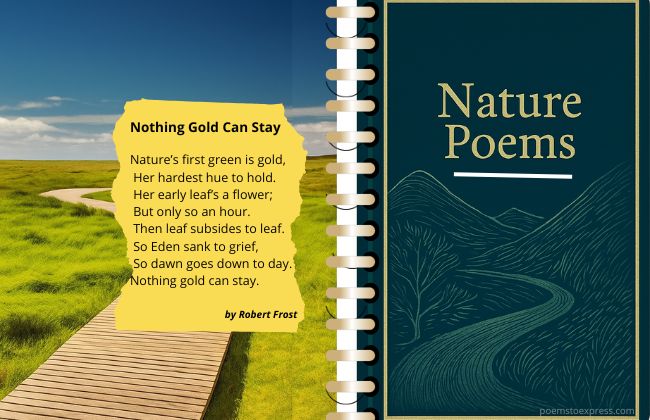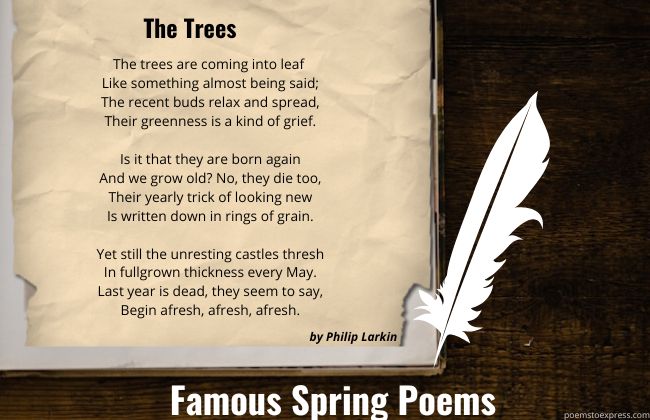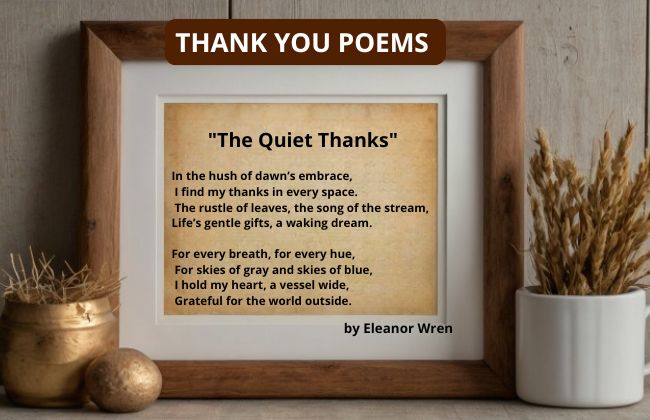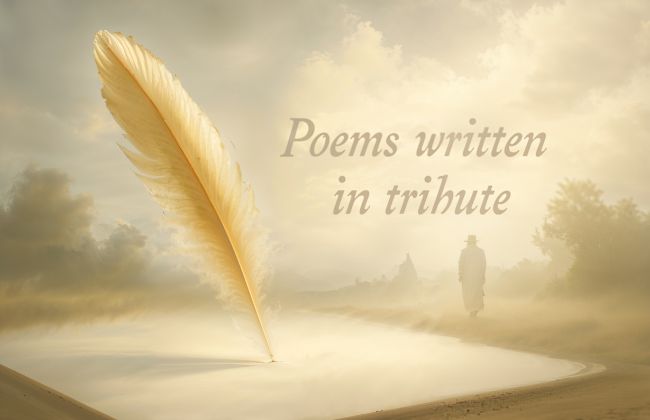Poetry is an art that transcends time, capable of capturing the essence of life in a delicate dance of words.
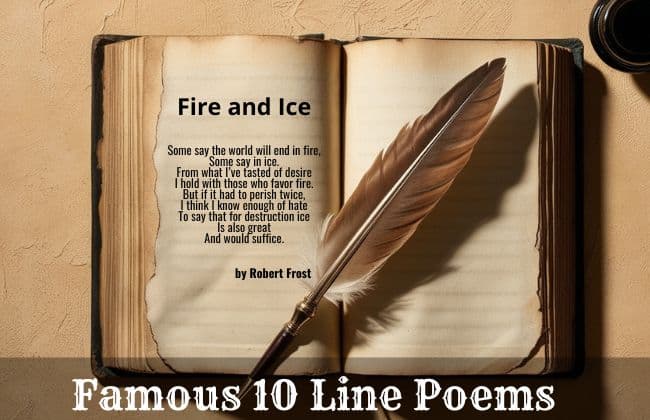
Among its diverse forms, 10-line poems stand out for condensing emotions, narratives, and reflections into a compact structure.
These verses maintain the richness and depth that characterize this literary genre. They often explore everything from the complexities of love to the subtleties of nature, demonstrating that brevity can be as impactful as longer poems.
The brevity of these poems challenges the poet to choose each word with intention, creating a piece of art that resonates long after it has been read.
If this poetic form has intrigued you, discover our selection of the top 10 ten-line poems. They are perfect for those seeking a quick and meaningful connection with poetry.”
Table of Contents
- 1 1) How happy is the little stone by Emily Dickinson
- 2 2) The Sun Sets in Molten Gold by Li Ching Chao
- 3 3) A Time to Talk by Robert Frost
- 4 4) A House of Cards by Christina Rossetti
- 5 5) A Gray Day by Ruby Archer
- 6 6) The Rabbit by Elizabeth Madox Roberts
- 7 7) A New Time-Table by Anonymous
- 8 8) Notes on the Art of Poetry by Dylan Thomas
- 9 9) S Okay (Carpe Diem) by Lawrencealot
- 10 10) Variation on a Theme by Rilke” by Denise Levertov
- 11 Analyzing the Structure of 10-Line Poems
1) How happy is the little stone by Emily Dickinson
Across its ten lines, Dickinson personifies the stone, describing it as happy on its solitary path, needing no companionship.
The poem suggests that happiness can be found in independence and simplicity. The stone, immune to human concerns and moving at its own pace, symbolizes a content and autonomous existence.
Dickinson reflects on the possibility that joy comes from accepting one’s own path in life, without seeking external approval or companionship.
How happy is the little Stone
That rambles in the Road alone,
And doesn't care about Careers
And Exigencies never fears—
Whose Coat of elemental Brown
A passing Universe put on,
And independent as the Sun
Associates or glows alone,
Fulfilling absolute Decree
In casual simplicity—
2) The Sun Sets in Molten Gold by Li Ching Chao
The poem “The Sun Sets in Molten Gold” by Li Ching Chao, written in ten lines, uses the image of the sunset to explore transience and ephemeral beauty. Li Ching Chao, one of the most important poets of the Song Dynasty, reflects in this brief poem both melancholy and regret for what fades away, but also captures the majesty of that moment.
This poem encapsulates the intersection of personal emotion and the universality of the natural experience.
The sun sets in molten gold.
The evening clouds form a jade disk.
Where is he?
Dense white mist envelops the willows.
A sad flute plays “Falling Plum Blossoms.”
How many Spring days are left now?
This Feast of Lanterns should be joyful.
The weather is calm and lovely.
But who can tell if it
Will be followed by wind and rain?

3) A Time to Talk by Robert Frost
Through the simple narrative of a man leaving his farm work to talk with a visiting friend, Frost celebrates the moments of human interaction that we often overlook in our daily routine.
The poem suggests that, despite the urgency and pressure of our tasks, we should prioritize personal relationships, which are essential for our happiness and emotional well-being.
When a friend calls to me from the road
And slows his horse to a meaning walk,
I don’t stand still and look around
On all the hills I haven’t hoed,
And shout from where I am, What is it?
No, not as there is a time to talk.
I thrust my hoe in the mellow ground,
Blade-end up and five feet tall,
And plod: I go up to the stone wall
For a friendly visit.
4) A House of Cards by Christina Rossetti
The poem, consisting of ten lines, addresses the fragility and temporality of human constructions, both literal and metaphorical.
Rossetti uses the image of a house of cards to symbolize delicate structures or situations that can easily collapse under pressure, reflecting the vulnerability of our efforts and relationships.
A house of cards
Is neat and small:
Shake the table,
It must fall.
Find the Court cards
One by one;
Raise it, roof it, -
Now it's done: -
Shake the table!
That's the fun.
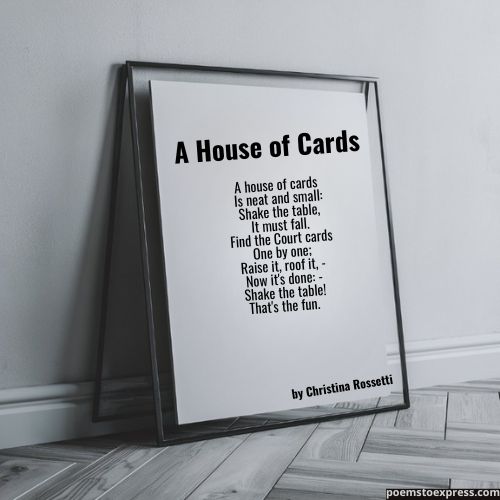
5) A Gray Day by Ruby Archer
The poem explores the emotional nuances and introspective atmosphere of a gray day. Through his concise and evocative description, Archer captures how a seemingly somber day can influence our mood and perceptions, inviting us into deep meditation.
This poem suggests that gray days, often associated with sadness, also offer an opportunity for contemplation and personal growth.
A gray day, and the gulls are gone.
Visor of mist o'er the sun is drawn.
The cordage creaks and the sails all strain,
The deck is drenched with the rushing rain,
The waves leap strong at the struggling keel,
And the ship rides madly with plunge and reel.
But the sailors shout as they haul away,
And merrily sing, for it's naught care they
For the wind that screams on the lee,
Or a gray day out at sea.
6) The Rabbit by Elizabeth Madox Roberts
The poem, composed of ten lines, captures a moment in nature, describing a rabbit in its natural habitat.
Through simple yet evocative language, Roberts paints the image of this small animal, highlighting its innocence and the simplicity of its life.
This poem reflects themes of vulnerability and the constant vigilance that the most fragile beings maintain in the face of the world’s dangers.
When they said the time to hide was mine,
I hid back under a thick grape vine.
And while I was still for the time to pass,
A little gray thing came out of the grass.
He hopped his way through the melon bed
And sat down close by a cabbage head.
He sat down close where I could see,
And his big still eyes looked hard at me,
His big eyes bursting out of the rim,
And I looked back very hard at him.
7) A New Time-Table by Anonymous
Using the metaphor of a new schedule, the poem suggests how changes, though often disruptive, can provide structure and a renewed sense of direction.
The “new schedule” may symbolize new opportunities or a fresh approach to life, emphasizing the importance of embracing changes and adapting to them with optimism.
Sixty seconds make a minute:
How much good can I do in it?
Sixty minutes make an hour,—
All the good that’s in my power.
Twenty hours and four, a day,—
Time for work, and sleep, and play.
Days, three hundred sixty-five
Make a year for me to strive
Eight good things for me to do,
That I wise may grow and true.
8) Notes on the Art of Poetry by Dylan Thomas
The poem is a ten-line work that reflects on the nature of the poetic creative process. Thomas poetically describes how inspiration for a poem can arise from intense and memorable sensory experiences.
This poem is a testament to the power of poetry to invoke vivid imagery and awaken deep feelings, highlighting the ability of the written word to transcend the everyday and the ordinary.
I could never have dreamt that there were such goings-on
in the world between the covers of books,
such sandstorms and ice blasts of words,,,
such staggering peace, such enormous laughter,
such and so many blinding bright lights,, ,
splashing all over the pages
in a million bits and pieces
all of which were words, words, words,
and each of which were alive forever
in its own delight and glory and oddity and light.
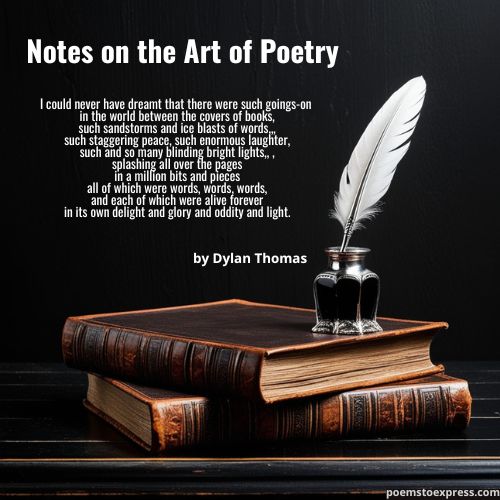
9) S Okay (Carpe Diem) by Lawrencealot
This poem explores the philosophy of “carpe diem,” or “seize the day,” encouraging readers to accept life as it comes and to value the present moment.
The poem adopts a comforting and encouraging tone, suggesting that it’s okay not to be perfect and that mistakes and failures are simply part of the human experience. It urges readers to move forward with hope and optimism, undeterred by difficulties.
Today has started out okay.
My house did not burn down.
My coffee's good
and hot.
My dog has gone outside to take a pee.
I don't
yet think I'm nuts,
and don't suppose I would
as long as my reality
is not at odds with simply feeling good.
10) Variation on a Theme by Rilke” by Denise Levertov
The poem “Variation on a Theme by Rilke” by Denise Levertov is a ten-line work that reflects on the connection between human beings and the universe, drawing inspiration from the ideas of the poet Rainer Maria Rilke.
Levertov explores how individuals are an integral part of the cosmos, emphasizing the idea that each person holds a significant place within the vast universal environment.
This poem highlights the interconnection between the self and the external world, encouraging a deeper exploration of our own existence in relation to the universe.
A certain day became a presence to me;
there it was, confronting me—a sky, air, light:
a being. And before it started to descend
from the height of noon, it leaned over
and struck my shoulder as if with
the flat of a sword, granting me
honor and a task. The day's blow
rang out, metallic—or it was I, a bell awakened,
and what I heard was my whole self
saying and singing what it knew: I can.
Analyzing the Structure of 10-Line Poems
Understanding Poetic Forms
A 10-line poem, also referred to as a decastich, can adopt various poetic forms, and its structure can vary greatly.
These poems offer a middle ground between the brevity of a short poem and the expanded narrative of longer verse.
They are not bound by one specific form; rather, they can include elements of traditional poetry such as the sonnet, especially the sonnetina—an Italian sonnet variant with 10 lines.
The structure of a 10-line poem typically consists of a specific metre and rhyme scheme, though these can vary widely.
Common structural patterns in 10-line poems include:
- Rhymed: Rhyming schemes such as ABBAABBAAC.
- Blank verse: Unrhymed but in iambic pentameter.
- Free verse: No set meter or rhyme scheme, offering maximum flexibility.
Common Themes and Topics
With only ten lines to convey their message, poets must use each line efficiently, leading to precise and expressive language.
Common themes range from personal experiences to universal subjects, including but not limited to love, nature, loss, and existential contemplation.
The structure encourages the expression of a single, focal idea or emotion, with each line building upon the last to culminate in a resonant conclusion.
Examples of themes in 10-line poems are:
- Love: Expressions of affection, heartbreak, or romantic longing.
- Nature: Observations and reflections on the natural world.
- Loss: The articulation of grief, absence, or memory.
You might also like:

